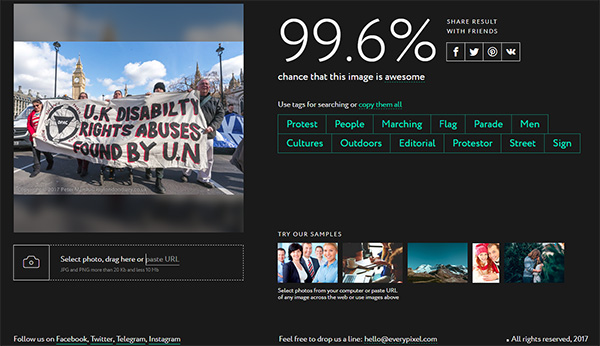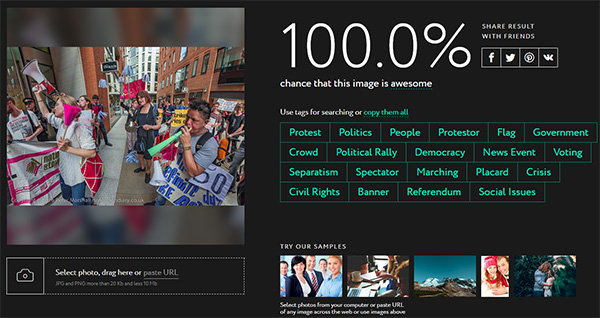There is, according to the Everypixel Aesthetics Test, a 99.6% chance that my picture uploaded to their test page below is awesome:

Well, actually it isn’t, just a rather ordinary image, typical of many that I take. Publishable? Yes, and fairly nicely done, but certainly not awesome. Here it is rather larger so you can judge for yourself:

It’s clear, leaves no doubt about what it is – spells out in the banner who the group is carrying it and why they are protesting. And they are obviously marching down a street in London as I caerfully took it with ‘Big Ben’ in the background. You can see too that it is part of a larger demonstration as there is another banner to the right. Clearly the people are actually walking along a road – except for one in the middle – and you see the wheels of her wheelchair. It’s competent, even precise (if rather hurriedly processed) but awesome? No.
I tried out the 14 images currently on the front page of my website My London Diary, on the test page, and the results were interesting, with this image getting the highest score, though there were others that ran it close. And one that I rather like that only scored around 25%.
Clearly the algorithm used to set the scores needs some more work, and I doubt it will ever be able to spot the awesome, though it might well be able to weed out the truly hopeless. And when I hear some picture editors get sent 50,000 images a day that could certainly be useful. There is a disclaimer on the page, which admits it isn’t really – despite the name – makeing aesthetic judgements at all. It states:
Surprised by the result? This service doesn’t measure the coolness or beauty of a person or any object in a photo. It cares only about technical parts like brightness, contrast, noise and so on. Service doesn’t dedicate for historical photos, illustrations or 3D visualizations.
What is surprising – and perhaps even at the currrent basic level useful is the ability to generate keywords from the visual content. This is perhaps a fairly simple image, and some of the others I tried were a little more impressive, but here is the algorithm-generated list for the image above:
Protest, People, Marching, Flag, Parade, Men, Cultures, Outdoors, Editorial, Protestor, Street, Sign,
It isn’t 100% accurate – but then neither are my own hand-crafted keywords for images, particularly since time constraints often mean I’ll synchronise a list across a whole set of images, and only fine-tune them for individual images if I have time later. Obviously this list doesn’t have any of the more specific keywords I’d find essential, but only because the agency I place most pictures with doesn’t make sensible use of captions for searching its image library.
Writing good captions is essential – and the old rules still hold, though so many images on the web and on many sites selling images are full of images are lacking. But captions for photographs to go in an online library are not the same as captions that will be used when an image is printed in a newspaper, magazine or book.
One of the old and good rules about captions in printed material is not to state the obvious. But to be computer searchable image captions need to include the obvious as they will generally be read without the image when searches are conducted. And while you may send a batch of images and feel you don’t need to mention some piece of information on every one, you have to remember that searchers – machine and human – are often going to see just a single one of them.
The 5 W’s remain essential:
- What
- Who
- Where
- When
- Why
and sometimes there is a How worth adding.
Something like Everypixel or an enhanced version of it, taken together with software that could parse captions to generate keywords from them could make assigning keywords unnecessary. Actually computing power is now such that there is no reason not to search captions and give them greater significance in searches. After all, any editor likely to want to use that picture above would be looking for a generic ‘Protest’ but would be interested in a protest about ‘disability rights’ or the UN and UK disagrement or the organisation named on the banner or some other specific. And those would be in the caption but are not in Everypixel keywords.
Going further down the Everypixel web page we find that they actually – despite the disclaimer above – make the claim that their ‘Heartless algorithm‘ has ‘learned to see the beauty of shoots in the same way as you do‘ because it has been trained using Artificial Intelligence techniques on a sample of images provided for them by ‘designers, editors and experienced stock photographers‘. My short test on the site suggests to me that there is still a very long way to go.
I rather hope it does work, as they suggest it might be used for ‘intelligent image curation‘, giving high-scoring images a higer ranking in search results, and I think I would generally benefit from this. I’m often apalled at the poor quality images used by the press when I know that much better and more appropriate images by myself and others are available if only those resonsible for finding images had done a better search.
But I’m just a little worried about it being used to weed out low-scoring images. I suspect it would eliminate all of the most creative and unusual pictures along with the rubbish. It does give some scores in the 20% range to some of my favourite images.

But I’m pleased to say that sometimes I agree with the software!
______________________________________________________
There are no adverts on this site and it receives no sponsorship, and I like to keep it that way. But it does take a considerable amount of my time and thought, and if you enjoy reading it, a small donation – perhaps the cost of a beer – would be appreciated.
My London Diary : Buildings of London : River Lea/Lee Valley : London’s Industrial Heritage
All photographs on this and my other sites, unless otherwise stated, are taken by and copyright of Peter Marshall, and are available for reproduction or can be bought as prints.
To order prints or reproduce images
________________________________________________________